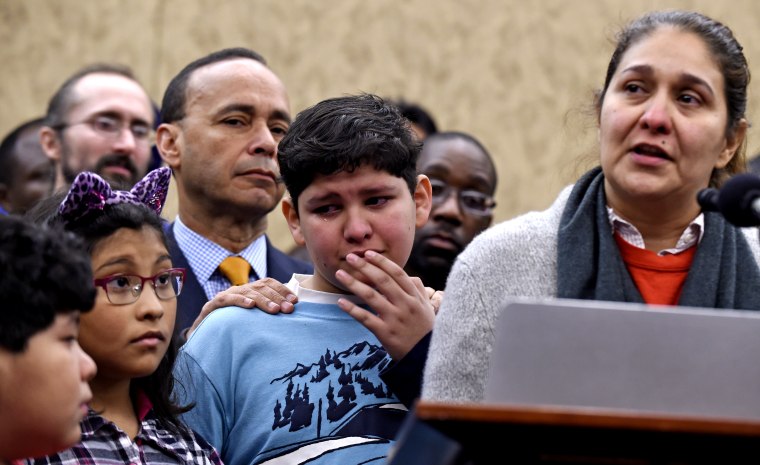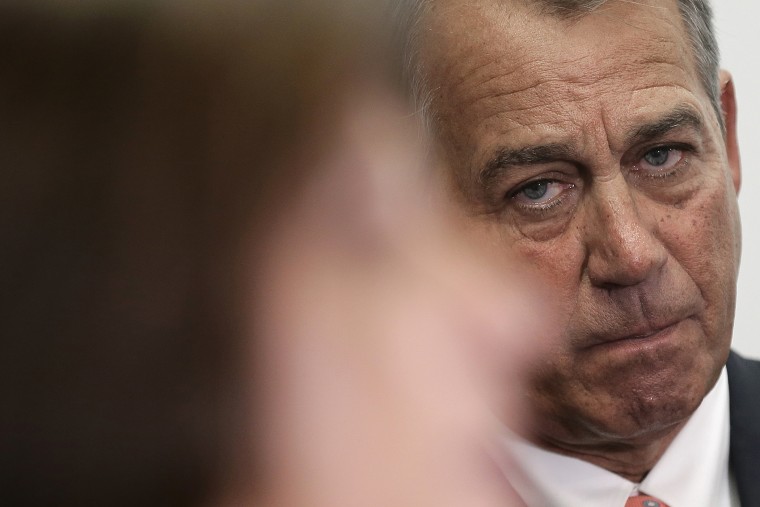HERSHEY, Pennsylvania -- At their annual retreat just one year ago, House Republican leaders announced an ambitious proposal to eventually allow millions of undocumented immigrants to stay in the U.S. At this year's GOP gathering, immigration is once again the leading topic -- only this time the debate is over how best to threaten all 11 million undocumented immigrants with blanket deportation and whether it’s worth shutting down the Department of Homeland Security to do so.
The Republican-controlled House passed legislation to that effect earlier this week, which the Senate is unlikely to pass and the White House has threatened to veto. GOP lawmakers huddled here on Thursday to discuss their next steps.
It's a far cry from the same gathering in January 2014, where GOP leaders were drawing tentative praise from Democrats and advocacy groups for their willingness to work out a productive solution on immigration reform.
"The day after the 2012 election, I said it's time for Congress and the president to deal with this very important issue," Speaker John Boehner told the press last year after releasing a list of Republican principles for reform. "I think it's time to deal with it."
What’s odd about the new standoff over deportation is that the message from last year’s retreat hasn’t changed. According to House GOP leaders, immigration reform is still always right around the corner.
"I'm very optimistic about it, more optimistic than I have ever been,” House Oversight Committee Chairman Jason Chaffetz told NBC News.
“I think you'll see a willingness to deal with an immigration system that’s broken and try to fix it,” House Majority Leader Kevin McCarthy told msnbc when asked whether legislation granting legal status to any undocumented immigrants was still possible.
The Senate passed a bipartisan immigration reform bill in 2013 only to see the legislation stall in the House. At last year's party retreat, National Republican Congressional Committee chairman Greg Walden told reporters he expected the House GOP would push forward with a vote on immigration reform once the midterm election primaries were over and members no longer faced a threat from the right. Instead, a tea party challenger took out then-House Majority Leader Eric Cantor on an anti-“amnesty” platform, further scaring members away from the issue.
Boehner announced shortly afterward that the House would not bring up any immigration legislation that year -- even bills crafted entirely by Republicans.
RELATED: House votes to gut immigration actions
So does Walden think things are over for reform? Not hardly. “This is a new Congress, it’s a new day, its time for a fresh start and we intend to move down that path,” Walden said.
At the start of a press briefing Thursday, Walden paused to note one reporter munching on a five-pound giant Hershey bar, a souvenir from the famous chocolate manufacturing town.
“Is it your goal to eat that by the end of the [retreat]?” Walden asked.
“I’m going to eat it before you guys pass something on immigration,” the reporter replied.
Republicans argue their recent actions are in response to President Obama's planned executive action that would shield some 5 million undocumented immigrants from deportation. GOPers have decried the president's "overreach" and say the current debate doesn't represent the party's take on the underlying immigration issue. A Republican aide said lawmakers discussed "how we need an immigration system that secures our borders; boosts our economy; and rewards those who have done things the right way" at their retreat as well. Missing from those goals is any pledge to address existing undocumented immigrants.
In the meantime, activists can only judge them by the votes they take. The House this week went significantly further than targeting Obama’s planned action, passing amendments that would undo a 2012 program protecting young undocumented immigrants known as DREAMers and wipe out a 2011 memo ordering law enforcement officials to prioritize dangerous criminals for deportation. Taken together, the bill's clear effect would be to target all undocumented immigrants for removal as one undifferentiated group.

"I think from our perspective, the approach from Republicans is very clear at this point," Cristina Jimenez, managing director of United We Dream, told msnbc. “And that approach is ‘Deport them all.’”
Activists like Jimenez shifted gears from courting Republican votes in early 2014 to demanding President Obama take unilateral action mainly because they had given up hope on the House ever coming around to a solution. It’s not that there aren’t pro-reform Republicans. The House vote this week garnered a surprising amount of Republican dissent, some 26 votes, but most of the “no” votes were in districts with large Hispanic constituencies, a small pool within a caucus overwhelmingly planted in safe, disproportionately white, seats.
“I think we've not handled the issue well,” California Congressman Jeff Denham, who voted against the amendment, told reporters. “It will be important before the 2016 elections to actually show that we can accomplish something on immigration reform.”
It’s hard for politicians to discuss immigration without also getting into the next presidential race. Mitt Romney, the 2012 GOP nominee running on a “self-deportation” plan for undocumented immigrants, badyly lost the Hispanic and Asian vote. Republicans recovered in the 2014 midterms, but the elections were largely fought in states where Latino voters played a small role. Many Republicans fear that without further changes, the party's 2016 nominee will face an uphill climb in swing states like Florida, Colorado, and Nevada.
“I did learn the Electoral College does matter,” said Congressman Paul Ryan, Romney’s 2012 running mate and a leading pro-reform voice in the caucus. “I think more and more these days people are beginning to realize in the House and the Senate that you can’t save this country, that you can’t fix these problems, if you don’t win the White House.”
Ryan, who has ruled out a presidential bid in 2016, added that there was a “real desire in our party” to tackle the immigration issue.
So what kind of bill can the GOP pass and when is it coming?
“It’s premature to get into that,” Ryan said.
